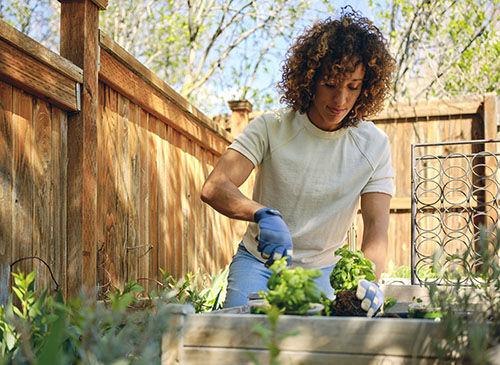Shade-loving Herbs
May 15, 2023

For many, spring means it’s time to get your hands dirty. However, depending on where you live and how many acres are available, finding an area that has sufficient sunlight for a garden may be a challenge.
The good news? There are lots of herbs that can be grown in the shade; in fact, many herbs actually prefer low-light conditions. While the exact amount of sunlight that herbs need depends on the variety, there are several that can grow with less than eight hours of sunlight per day, while some will thrive with as little as four hours of direct light.
Listed below are 15 herb varieties that grow well in the shade:
Low-light gardens do have some unique challenges, though. Follow these five tips for the best success:
Even for those of us who have sun-challenged gardens, focusing on the plants listed above will provide your family with enough harvests to satisfy their herbal appetite. The agronomy experts at your local Co-op can give you more advice on low-light gardening, as well as send you home with all the necessary supplies to get started. Find the nearest location here.
For more content like this, check out the latest issue of The Cooperator.
The good news? There are lots of herbs that can be grown in the shade; in fact, many herbs actually prefer low-light conditions. While the exact amount of sunlight that herbs need depends on the variety, there are several that can grow with less than eight hours of sunlight per day, while some will thrive with as little as four hours of direct light.
Listed below are 15 herb varieties that grow well in the shade:
- Thyme
- Oregano
- Cilantro
- Mint
- Sorrel
- Rosemary
- Lovage
- Calendula
- Summer Savory
- Perilla
- Dill
- Parsley
- Sage
- Chervil
- Basil
Low-light gardens do have some unique challenges, though. Follow these five tips for the best success:
- Monitor growth — Without enough sunlight, herbs often grow tall and leggy, meaning they have very long stems with just a few leaves on top. Regularly snip off the outermost stems to encourage branching and keep the plant more compact. When you harvest, remove slightly more growth than you would for herbs grown in the sun as this will keep the plant from producing flowers that may alter the flavor.
- Don’t overwater — Herbs that are grown in the shade need less water than those in full sunlight, and the soil can quickly become soggy with overwatering. Therefore, make sure you allow the soil and herbs to dry out more between waterings.
- Don’t over-fertilize — Because herbs that grow in the shade are already prone to being leggy, feeding them too much will only encourage even more weak and spindly growth. Go easy on the fertilization and consider using a liquid fertilizer no more than once every 6 to 8 weeks.
- Protect against pests — Many pests like to feed on plants that are growing in less-than-ideal conditions. Monitor your plants to ensure that aphids, caterpillars, beetles, and other bugs do not harm them.
- Choose the right plants — If you’re looking to expand your garden beyond the varieties listed above, choose herbs that prefer cooler weather and that are harvested for their leaves rather than flowers.
Even for those of us who have sun-challenged gardens, focusing on the plants listed above will provide your family with enough harvests to satisfy their herbal appetite. The agronomy experts at your local Co-op can give you more advice on low-light gardening, as well as send you home with all the necessary supplies to get started. Find the nearest location here.
For more content like this, check out the latest issue of The Cooperator.